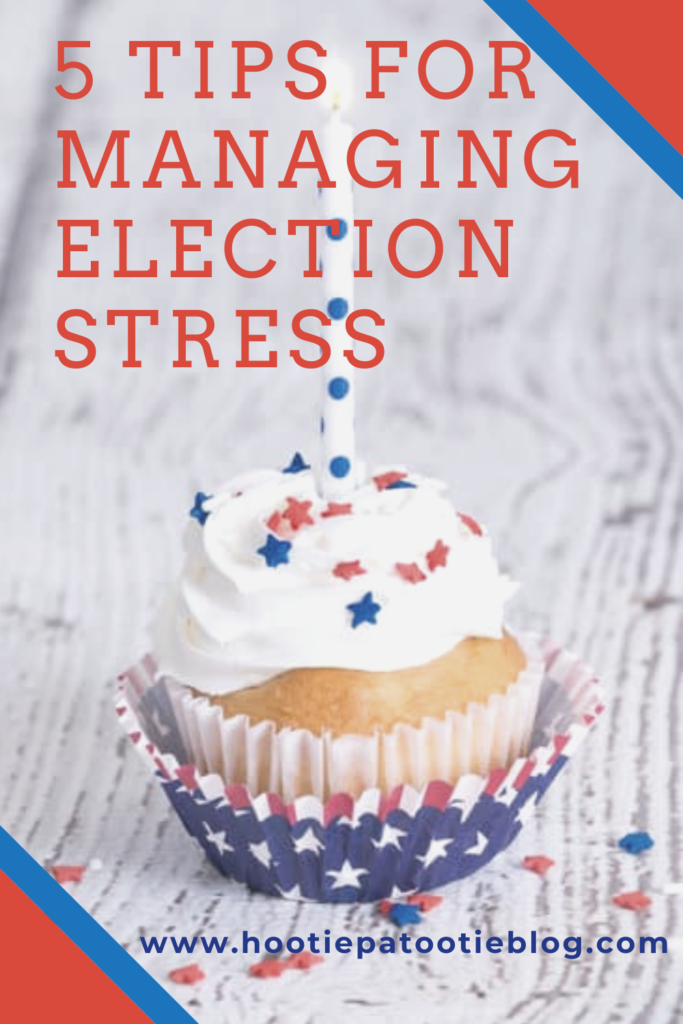
After months of listening to campaign speeches, watching political rallies, and scrolling through political social media posts, we have finally reached election time! Although we are fortunate that as citizens, we are able to cast our votes and influence election results, for many people it can be a stressful time. For some, their elevated stress level is due to the high stakes and uncertainty of the outcomes. For others, it can be because of the contentious relationships with friends/family members who align with the opposing side. Some folks struggle with stress from both issues. No matter the cause(s), the goal remains the same: work toward lowering those stress levels! Here are some tips for managing stress during election season:
- Be aware but not obsessed. Being an informed citizen is important, but like most things, there should be limits. Many people may find themselves clicking on articles and watching news clips with poll updates, which can be helpful for those wishing to stay informed of the current and projected numbers. For some, however, constant checking of multiple news sources and spending most or all free time deep diving into the current political statuses can be stress-inducing. It can be especially difficult because in recent years, election results have not necessarily been determined on the actual election date. With today’s voting appeals, recounts, and other potential issues, the election results can take days or even weeks to be determined. Spending that length of time with elevated stress levels is not recommended. Place limits on the amount of news and updates consumed; if needed, implement news fasts or take breaks from election coverage.
- Steer clear of certain conversations. As members of a modern nation, people should be able to have civil political discussions with others. In some situations, this can actually happen and can benefit relations among those who disagree politically. Unfortunately, due to the current state of political divisiveness, having some of these conversations can negatively impact and even destroy relationships. There is a reason why friends and family members are often advised against discussing religion or politics! It may be most important to consider a “picking battles” approach. Political discussions could be cordial and meaningful with those whose beliefs are politically similar or even those who are undecided on who they are voting for. However, when it comes to those with strong political opinions or radical political positions, it may be in the best interest of the relationship to avoid those talks.
- Proceed with caution on social media platforms. Nearly everyone has a presence on at least one social media platform. There are many benefits to it and one of the biggest is that it allows people to stay connected with those they care about. During the election season peaks, many people will share politically charged posts in an effort to share their candidate’s strengths and capitalize on the opposing candidate’s weaknesses. For those who find the posts to be upsetting or triggering, it may be best to temporarily mute those sharers or take breaks from social media to manage emotions.
- Increase self-care. In the midst of tense times, one way to help lower stress is by increasing self-care. Stepping away from the television, laptop, and phone election coverage is a good start; it can be even more effective if the break includes some time in nature by taking a walk outside, lounging in a cozy hammock, etc. Relax by listening to a guided relaxation talk-down, completing a deep-breathing cycle, taking a bath, or doing a few yoga flows. Distract yourself from stressful updates by listening to music, working a jigsaw puzzle, knitting something, or painting your nails or applying a face mask. Self-care is very personal, so there is no right or wrong variation, the important part is to apply it liberally during stressful moments.
- Reach out to supports. Uncertainty of the upcoming changes can be anxiety-provoking. The stakes are understandably high, so it is important to be mindful that regardless of the outcome, there are supports out there to lean on. Reach out to emotionally supportive friends or loved ones if you are having difficulty managing your emotions or feel overwhelmed by results; they may be able to hold space with you and provide you some comfort and help ease your distress. Seeing a mental health professional (counselor, therapist, social worker, psychologist) during a stressful election season can be a valuable way to cope with emotions. You can also reach out to your primary care physician for medication or other mental health resources and assistance with physical stress symptoms. Finally, if you believe you are having a mental health crisis, call the National Mental Health Hotline by dialing 988 or call 911 for emergency assistance.
Nice blog
Thank you so much!
Any new tips on coping, now that the moronic majority of voters has voted against its own self interest and sold the rest of us down the river in the process? I could use them now.
I understand–it is such a difficult time. I actually did write this post last week. Hopefully it will bring you some peace. <3 https://hootiepatootieblog.com/handling-difficult-election-results/